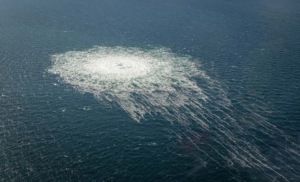News
Whodunnit: The Nord Stream mystery continues
This article is more than 2 years old.

The explosion caused extensive damage to the seabed around Bornholm (photo: Forsvaret)
Any hopes that the mysterious object found attached to the Nord Stream pipeline might reveal the culprit of the September explosions seem to have been dashed.
Military researcher Johannes Riber has stated that it is extremely unlikely that the object, measuring 10 by 40 cm, has anything to do with the sabotage, reports DR.
It is clear, states Riber, that it was lying on the seabed for some time before the explosions, as it is covered in detritus.
“In addition, the object is too small and too far away from the site of the explosion to have had a role in the explosions,” he added.
As investigations continue, Danish authorities have invited Russian-owned company Nord Stream AG to participate in the salvaging of the object.
The game is afoot, my dear Watson!
Oliver Moody of The Times of London has referred to the Nord Stream debacle as “one of the great geopolitical whodunnits of the 21st Century”.
In an article published this morning, Moody elucidated four main theories that have emerged so far as to who was responsible for the explosions.
So far Russia, Ukraine, the USA, the UK and even some of the nations closer to home.
Red herrings and fishy stories
What is more, certain strange events transpired in the days leading up to the explosion: not least the unusual movements of the vessel Danish P524 Nymfen from September 21-25, which ventured into waters it had not sailed for years.
The ship then inexplicably switched off its transponder and disappeared from international tracking systems for several hours.
At the same time, Swedish military were surveilling the area. What could have triggered this?
The four principal theories are all either incomplete or implausible, making for a classic whodunnit worthy of Poirot or Inspector Morse, but on a vast international scale.
We take a look at them to get an idea of where investigations have been leading.
Theory 1 – Oslo operatives
In February, Seymour Hersh, an American investigative journalist with a long history of uncovering human rights abuses, claimed that the bombs had been placed by CIA divers. Norway was also allegedly involved in helping the Americans.
The claims were released in an essay that had just one anonymous source as evidence.
Initially the allegations carried clout, mostly because of Hersh’s calibre as a journalist, but inconsistencies and inaccuracies were soon spotted in his story, making this theory the least likely of the four.
Theory 2 – the Andromeda feign
This narrative begins with the rental of a yacht, the Andromeda, by a Polish company in the German port of Rostock.
The boat, crewed by six men alleged to have travelled into the country on expertly forged passports, proceeded to sail around the Baltic, mooring at the Danish islands of Rügen and Christiansø. Both islands are close enough to the site of the explosions to raise eyebrows.
Searching the boat in February, the German authorities found traces of explosives onboard.
A paper trail has ultimately linked the boat rental to a Ukrainian business magnate, whose identity has not been disclosed publicly. The Ukrainian government has denied having anything to do with the explosions.
There are also concerns that this story could be a red herring: why would professional saboteurs carry around 500 kilos of TNT on a 15-metre sailing yacht?
Theory 3 – Minerva the observer
Minerva Julie is the name of an oil tanker that flies a Greek flag, but in early September was passing through the Baltic headed to St. Petersburg.
On September 6, it stopped at a site near that of the Nord Stream explosions and turned its engines off. For the next four days it drifted around that area, only moving when it came too close to Danish waters.
The operator of the tanker has since said that they were simply awaiting further instructions. But Minerva Julie had not done anything of this sort in the months leading up to its September voyage.
Theory 4 – Russian subterfuge
The last theory is perhaps the most obvious, although it suffers from an almost complete lack of evidence.
The idea is that a Russian submarine or ship, with its electronic identifiers switched off to avoid detection, conducted a stealth mission.
The main clue that this might be the case is the unusual activity of P524 Nymfen in late September, along with that of the Swedish military.
While we do not have confirmation of the meaning of these movements, it certainly adds to the mystery in which the Nord Stream explosions are steeped.
Will we ever know?
As it stands, more evidence is needed, at least, to get a clear idea of who might have done it. Tantalisingly, for now, it could still be one of many very different suspects.
With the ‘object’ discovered by Energistyrelsen unlikely to shed any light on the situation, we will have to wait for something (or someone) else to provide a fresh twist in the plot.










































